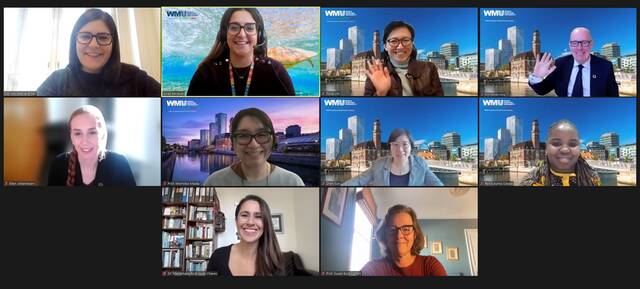On 13 February, the World Maritime University (WMU) – Sasakawa Global Ocean Institute hosted a public webinar, “Information Session for the Stakeholder Consultative Forum established for the Programme on Empowering Women for the United Nations Decade of Ocean Science for Sustainable Development”. The Empowering Women Programme team presented their findings and work to date and discussed the broader inclusion of women and girls in science.
Dr Mariamalia Rodriguez Chaves, Post-doc Fellow, presented her research on gender mainstreaming in ocean governance bodies, including updates from her preliminary data collection. Presentations on research achievements and progress to date were also made by PhD candidates Ms Ellen Johannesen on the topic of “Understanding the role of gender in the Practice of International Marine Science” looking at the International Council for the Exploration of the Sea (ICES) as a case study, and Ms Renis Auma Ojwala on the topic of “Gender Equality in Ocean Science for Sustainable Development: Analysis of Ocean Science Institutions in Kenya”. An interactive session followed on the objectives and planned activities of the Stakeholder Consultative Forum, with input from participants on the question: “What are the good practices to promote women’s empowerment?”
Professor Ronan Long, Director of the WMU- Sasakawa Global Ocean Institute, delivered closing remarks and emphasized the importance of ensuring gender equality as a central pillar of all Ocean Decade initiatives and highlighting important actions at individual, institutional, and governmental levels. Individual actions include advocacy and awareness as well as participation and support for pathways to empower women and to remove barriers to gender equality. Institutional actions include collecting gender disaggregated data and implementing gender-responsive policies that focus on measurable outcomes including reconciling work with family life regardless of gender. Governmental actions include gender equality provisions in international instruments, and ensuring effective women’s representation in decision-making bodies/senior leadership positions. Most importantly, Professor Long emphasized that gender equality is never an isolated aspect.
The webinar was attended by participants from 43 countries including members of the Stakeholder Consultative Forum.

About the DFO-WMU Empowering Women for the United Nations Decade of Ocean Science for Sustainable Development Programme
The purpose of the Empowering Women Programme is to advance an alternative, inclusive model for the sustainable governance of ocean spaces and maritime activities that duly takes into account the need to ensure effective gender equality and the empowerment of women at all levels in order to ensure the sustainable management of the global ocean. The Programme is endorsed by IOC-UNESCO as a Decade Action and will play a central role in supporting the Ocean Decade mission to catalyze transformative ocean science solutions for sustainable development. The Empowering Women for the United Nations Decade of Ocean Science for Sustainable Development Programme is generously funded by Fisheries and Oceans Canada (DFO) with additional support from The Nippon Foundation.
About the WMU-Sasakawa Global Ocean Institute
The vision of the WMU-Sasakawa Global Ocean Institute is to act as an independent focal point for the ocean science-policy-law-industry-society interface where policy makers, the scientific community, regulators, industry actors, academics, and representatives of civil society meet to discuss how best to manage and use ocean spaces and their resources in accordance with the United Nations 2030 Agenda for Sustainable Development. The Institute was inaugurated in May 2018 and made possible through generous support from The Nippon Foundation of Japan, the Governments of Sweden, Canada, and Germany, as well as the City of Malmö.
